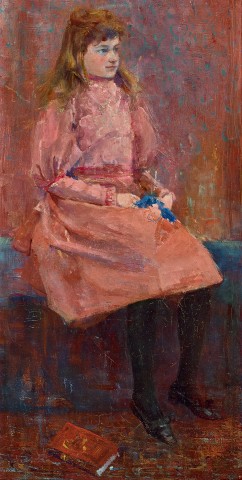DOROTHY - DAUGHTER OF JOHN STEVENS ESQ, 1890
CHARLES CONDER
oil on canvas
35.5 x 18.5 cm
signed and dated lower right: Chas. Conder / 1890
John Stevens, Melbourne, commissioned from the artist in 1890
Dorothy Purbrick (née Stevens), Victoria, by descent from the above
Eric Stevens Purbrick, Victoria, by descent from the above
Leonard Joel, Melbourne, 20 February 1970, lot 30 (as 'Portrait of a Young Girl, Dorothy Stevens')
Max Carter, Adelaide
Thirty Victoria Street, Sydney
Private collection, Sydney
Private collection, New South Wales
Private collection, Sydney
Private View: Pictures by Mr. Arthur Streeton, Mr. C. Douglas Richardson, Mr. Charles Conder, Gordon Chambers, Melbourne, 13 – 15 March 1890 (as 'Miss. Dorothy Stevens’)
Winter Exhibition, Victorian Artists' Society, Melbourne, 29 March 1890, cat. 103
Table Talk, Melbourne, 7 March 1890, p. 6
‘The Victorian Artists' Society Annual Exhibition', The Age, Melbourne, 29 March 1890, p. 15
‘Victorian Artists' Society. Winter Exhibition. Final Notice', The Argus, Melbourne, 5 April 1890, p. 6
Punch, Melbourne, 10 April 1890, p. 224
Hoff, U., Charles Conder: His Australian Years, National Gallery Society of Victoria, Melbourne, 1960, cat. 52, p. 24 (as 'Portrait of Dorothy Stevens')
Hoff, U., Charles Conder, Lansdowne Press, Melbourne, 1972, cat. C70, p. 102
The visual wit of Charles Conder’s painting is unique in Australian art. From brilliant colour to figuration and composition, it ranges from the subtle to the blatant, couched in terms of aesthetic delight. Red plays a major role in a number of works of the time, especially in That Fatal Colour, 1888 (private collection, Sydney) where the red parasol of the lady dressed in white attracts the unwelcome attention of a cow - or perhaps bull. In A Holiday at Mentone, 1888 (Art Gallery of South Australia), red continues to attract attention – hats, an upturned parasol and the red page of a newspaper, while the two, suited male figures, supine and erect, harmonise with the horizontals and verticals of the pier, shadows included. Rickett’s Point, 1890 (National Gallery of Victoria, Melbourne) again shows Conder’s delight in the red parasol as a focal point - here rolled, in keeping with the painting’s narrow format, it reflects the length and breadth of the beach. Each painting shows the striking individuality of Conder’s art during this golden period. Moreover, his portraits, especially those painted in Australia, have a particular appeal, fascinating both for the likenesses they preserve and their aesthetic appeal. Two classic examples are Sketch Portrait, c.1889, (National Gallery of Victoria) and An Impressionist (Tom Roberts), 1889, (Art Gallery of New South Wales) – both of which were featured in The 9 By 5 Impression Exhibition, Melbourne of 1889.
The following year, Conder showed six works in the Victorian Artists’ Society’s Winter Exhibition. They included Dorothy – Daughter of John Stevens Esq., 1890, and two major landscapes, the aforementioned Ricketts Point, 1890 and The Yarra, Heidelberg, 1890 (National Gallery of Australia, Canberra). The exhibition is also memorable for major works by others too, especially Arthur Streeton’s ‘Still glides the stream, and shall for ever glide’, 1890 (Art Gallery of New South Wales) and Frederick McCubbin’s A Bush Burial, 1890 (Geelong Gallery). In early March, prior to the Victorian Artists’ Society show, Conder, together with C. D. Richardson and Arthur Streeton, held a private view in their studios at Gordon Chambers, Flinders Lane. Reviewed by Melbourne’s Table Talk, it was noted that:
‘Mr. Conder has painted a small portrait (a commission) of Miss Dorothy Stevens, daughter of Mr. John Stevens, and is commencing work on a second commission – a panel portrait of Miss Janet Achurch (Mrs. Chas. Carrington). The first-mentioned evidences Mr. Conder’s fine sense of colour – a characteristic that is perceptible in a number of smaller studies’.1
The portrait’s colour continued to receive the critics’ approval later in the month when featured in the Society’s exhibition. The Argus observed ‘Mr. Charles Conder contributes a harmony in red’,2 while Melbourne’s Punch described the work as ‘A charming little study, quite Japanese in its decorative effect of red and blue background. The frame blends with the colour scheme.’3 The influence of Japanese art, especially colour, composition and format, on Conder’s work at this time was pronounced. The narrowness found in some Japanese colour prints, for example, is repeated in the bold vertically of our portrait, seen famously in Conder’s How We Lost Poor Flossie, 1889 (Art Gallery of South Australia) and horizontally in Rickett’s Point, 1890 (National Gallery of Victoria).4
English-born, Dorothy was to marry Reginald Purbrick, the Purbrick family being of Chateau Tahbilk winery fame established on the Goulburn River, Victoria in 1860.
1. ‘Art and Artists: Mr. Charles Conder’, Table Talk, Melbourne, 7 March 1890, p. 6
2. ‘Victorian Artists’ Society, Winter Exhibition. Final Notice’, The Argus, Melbourne, 5 April 1890, p. 6
3. Punch, Melbourne, 10 April 1890, p. 224
4. Hoff, U., Charles Conder: His Australian Years, National Gallery Society of Victoria, Melbourne, 1960, p. 15
DAVID THOMAS
